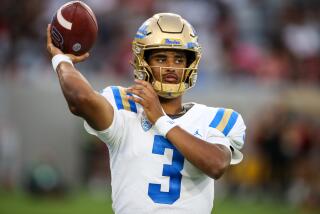Ferrero on Injuries: a ‘Get-Tough’ Philosophy
- Share via
Football has left its mark on Chuck Ferrero.
It is a scar that starts above his kneecap and ends just below it.
When this football season ends, Ferrero will undergo knee surgery for the fourth time. There will be no rush to recuperate this time, however.
Ferrero’s playing days ended 20 years ago after he broke vertebrae in his neck. At the time, he was a junior center at UCLA.
One sudden jolt and, just like that, his promising career was over. There was no question about it. The decision to quit wasn’t even his. It was his doctor’s.
Another inch and it could have been worse. He could have been crippled.
Ferrero never let his injuries--which were more severe than the pervasive sprains, separations and muscle pulls that are commonplace--sour him on football. To the contrary, he became a coach. He will soon finish his eighth season as head coach at Valley College and his philosophy on injuries has never changed.
He says they are part of the game.
“When a guy is good enough to leave high school and play college football, and nobody forces him to do it, he knows there is a risk,” Ferrero said. “He knows that he’s going to have to play with pain sometimes.
“If you’re going to compete in college football, or on the professional level, you have to be a tough individual, physically tough as well as mentally tough. You have to be able to go out there and do things when it’s not comfortable.”
Ferrero, 40, refers to injuries that are not debilitating as “nags.” These injuries include broken or cracked bones that can be wrapped in tape or supported by a flexible cast.
Ferrero believes that any player at the college level must be able to not only play but perform well with this sort of injury.
“Thigh bruises, ankle sprains, elbow contusions, shoulder contusions, those are part of the game,” he said. “Guys who can’t play with those don’t go too far in football.”
A player who is unwilling to play with the discomfort of an injury sometimes earns an unenviable label.
“They get a rap against them if they can’t play with pain,” Ferrero said. “A lot of people have that rap against them, especially running backs.”
Dondre Bausley, Valley’s tailback, is an exception. He has gained 1,123 yards on 167 carries despite playing most of the season with a pulled calf muscle. He suffered a painful thigh bruise in the first quarter against Antelope Valley two weeks ago but never told his coach. He rushed for 107 yards in the game.
“It doesn’t make any sense to tell the coaches how bad you’re hurting, they don’t want to hear it,” Bausley said. “I learned that when I first got here. That’s the commitment you make to the team, to play hurt.”
Ferrero likes that kind of attitude.
“Somehow, on Saturday, he’s always ready to go,” Ferrero said of Bausley.
And he isn’t alone.
Other Valley players also adhere to Ferrero’s “get-tough” philosophy. They have played with broken hands, broken fingers, strained ligaments and pulled muscles all season.
“Broken fingers are not catastrophic,” Ferrero said. “Very few guys have played college football who have not had broken fingers, slight shoulder separations, hip pointers or charley horses.”
The final decision on whether an injury is too severe to play with rests with the trainer or doctor, but a responsible coach also has a say.
“Most coaches today are pretty good about kids with injuries,” Ferrero said. “A coach is not going to deliberately hurt a kid. You can watch them in practice and usually tell whether they are going to be able to go or not.”
Ferrero knows firsthand about playing with pain. His scarred knee and the aches that have lingered for 20 years remind him of the choice he made.
He says he knew about the risks of football when he first strapped on his shoulder pads at UCLA. As a coach, he strives to make sure his players also know them.
“The risk of injury comes with the game,” he said. “You should know that going in.”
More to Read
Get our high school sports newsletter
Prep Rally is devoted to the SoCal high school sports experience, bringing you scores, stories and a behind-the-scenes look at what makes prep sports so popular.
You may occasionally receive promotional content from the Los Angeles Times.






